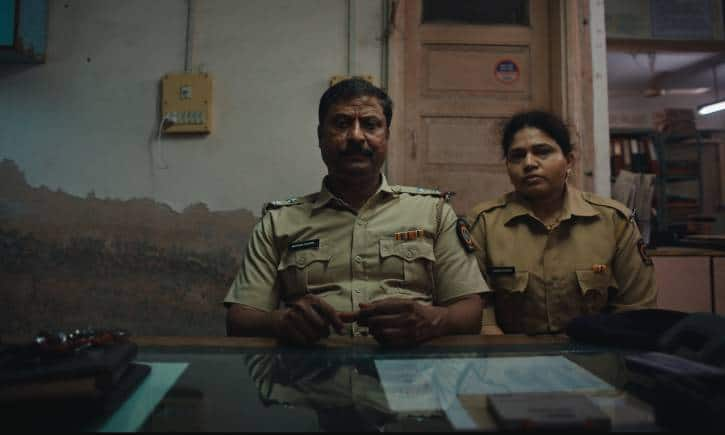



If one were to watch her crossover music videos (think a hybrid between old Hindi film songs reimagined as rap songs) and short films, written and directed by her, it would take one some telling to realise they emanate from the same creative mind. Reema Maya, formerly Reema Sengupta, is one such creative creature, who has disparate interests and defies any labelling. She also makes advertisement films.
In February, her music video Baazigar, by home-grown rapper Divine and featuring American rapper Armani White, released. In January, she was at the prestigious Sundance Film Festival, in the US, for the second time, the only Indian filmmaker to do that, with her short film Nocturnal Burger. And this week, she takes her film to the Indian Film Festival of Los Angeles (IFFLA).
ALSO READ: IFFLA 2023 preview: An Indian film festival in the heart of Hollywood
If Baazigar, like Bach Ke Rehna (Red Notice) with Badshah, Divine, Jonita Gandhi and Mikey McCleary, is male-centric, her films reflect social issues that she’s concerned about, emanating from her personal space. Like her first Sundance-premiered short film the Kani Kusruti-starrer Counterfeit Kunkoo (2018), Nocturnal Burger, too, wrests the lens to spotlight female issues and experience. Before these, she made two short films, The Tigers, They’re All Dead (2011) and Tyu’s Company (2012). The first is a satirical short on the circus around tiger conservation, about Mumbai’s last tiger having been shot dead, and the second is about loneliness as an offshoot of overdependence on technology, set in London.
The 1990-born started working at the age of 23 and has completed 10 years in the industry. “I entered the industry very young. I founded my production house Catnip in 2013,” she says. She has evolved as an artiste in the decade past. Her early shorts were naïve attempts but with the heart in the right place. Over time, the textual information and statistics, the footages and voiceover turned into short fiction telling a specific story with universal emotions.
By her own admission, she has three alter-egos as an artiste. “First, is to tell socially conscious stories with independent fiction. Second, is creating music-oriented video content. And, third, branded content, advertisement campaign films like Propah Lady (2019) for Puma.” She, like every human species, is a bricolage of disparate interests and experiences, which she channels through different formats. It could very well be an attempt to keep breaking any kind of boxing her into a type.
“We are all experimenting. I am…We need to push ourselves to be braver with our manner,” she says, further adding, “In 2018, mine was the only Indian film at Sundance Film Festival, it was the only second Indian short to be selected at Sundance in 16 years, and it is heartening to see so many Indian films thereafter.” Indian independent films have pervaded film festivals across the US over the years, and festivals like IFFLA has been at the forefront championing rare South Asian talents.
Why short films, though? A format that hardly finds exhibition (OTT) platforms and consumers in India. Maya’s attempt is to also break the biased attitude towards short films as a genre, “people take it less seriously, look at it as something film students make,” she says, adding that “you sharpen your claws with short films.”
However, it was only after Counterfeit Kunkoo which opened all doors for her. She got 200-300 commissioned projects. Sundance made her take herself more seriously and the need for her to reset her artistic compass and go back to her own voice.
If Counterfeit Kunkoo was about the problems single women face with regard to housing discrimination in Mumbai, and the issue of domestic violence and marital rape, Nocturnal Burger expands the scope of gender-based violence from the personal to the public, and trains the lens on a young girl.
Both stories emanate from incidents from Reema’s life and personal space, frustrations she has experienced up close. If the germ of the former short lay in her mum’s story — who, after Reema’s father walked away one day, floundered for a roof above her head, turned down by every real-estate agent she met seeking a rented accommodation — her latest film revolves around an inciting incident she and her mother witnessed on one night in Mumbai.
Many years ago, “I was coming back home with mom, and in a rickshaw next to us, something unfortunate was happening with a child. First I thought it’s an adult couple, but for a split second I saw the face of a girl, we stopped the rick and took them to the police station. That was a heavy night and it has stayed with me ever since. This was the story that was bubbling up inside me because it was emblematic of something really important. Almost all of us have gone through some form of abuse as kids and most of us have not received any justice, most of our experiences have not been validated. There are times when kids don’t realise what is happening, and then there are times when they confide in an adult, but no one believes them. That results in a lot of unresolved trauma. What was significant about this night was that the kid, at least, got some justice. She’s not going to have to wonder what happened to her and whether or not she had done anything wrong,” says Reema.
 A still from 'Nocturnal Burger'. (Image courtesy CATNIP)
A still from 'Nocturnal Burger'. (Image courtesy CATNIP)
The film explores many aspects of abuse, juxtaposing the young girl’s with a Northeastern woman’s repressed trauma, and the issues invisibilised transwomen face — all in all, the film’s about how one processes trauma. “It was important for me to tell, not just tell one story, but to explore the themes of abuse and trauma. There are immediate and long-term consequences (of trauma),” she says.
The short film opens to a black screen, with the sound of voices of a giggling young girl, amused by the compliment an older man, known to her, a school teacher (Somnath Mondal), pays her, “khoobsurat”, which she thinks means cute until he tells her it means “wow”, instantly objectifying the little girl into a sexualised being. The naïve, oblivious teenaged Minu (Bebo Madiwal) feels happy, and hopes the man would buy her a burger. Why burger?
“Burger is used as a symbol for vices of the big city, the allure and promise, a symbol for fast capitalism,” says Reema, adding, “also the fast food industry targets the children. It’s bad for you, but you still want it. This isn’t a big dream, but a small desire. Junk food, bright colours…children from humble backgrounds are scared to step inside, say, a McDonald’s store, they stay outside and aspire, hoping someone would buy them a burger.”
The red theme in the film, from Minu’s ribbons to the red-cloth bundled registers in the police station signal the continuing cycle of abuse and trauma and how so many such cases are lying like that. Minu is a child, the sense of fear, or confusion, or understanding or even just a gut feeling will develop in some years from now, in this moment, she has no vocabulary to communicate. Her greatest fear is her security-guard-father (Mukesh Pachode) will come thrashing her if he gets to know. Minu is brought to the police station — the police station, where primarily the whole film pans out — by Simi, based on Reema from the real incident. Another man (Pushpendra Singh, a veteran independent filmmaker) was witness, too, but tagged along with Simi, by himself he wouldn’t have taken the trouble to lodge an FIR. Simi is played by Millo Sunka, an actor who traces her roots to Arunachal Pradesh and has worked in the film Axone (2019) and web-series The Last Hour (2021).
 A still from 'Nocturnal Burger'. (Image courtesy CATNIP)
A still from 'Nocturnal Burger'. (Image courtesy CATNIP)
Reema begins with an incident or situation and broadbases the story in her short films. There are layers that make themselves apparent. If in Counterfeit… one woman’s experience stood in, and spoke, for a whole community of women, in Nocturnal…, she shows a whole spectrum of what constitutes women, the intersectionality, and female experiences that are joined at the hip. Young child Minu’s susceptibility to sexual abuse defies spatiotemporal reality. It happens anywhere and everywhere, at any point in life. “Casting net was very wide, anybody from anywhere,” says Reema, adding that her decision was “how do we show that child sexual abuse doesn’t happen only in this (underprivileged) class, but in every class (Simi).”
It happened in Simi’s life, too, a trauma she’s nursed all along, one that scarred her, left her sceptical, and wanting of genuine love and care. Reema deploys paranoia, fantasy and escapism — “all the montages are cutaways” — to signal Simi’s recession into her past trauma, into that dark abyss she had locked away. Through Simi, Reema also brings out the easy stereotypes and discrimination a person from the North-East faces in the mainland, without overt grandstanding. The inherent violence exists in everyday language. Policeman Shinde (Shrikant Mohan Yadav) asks Simi where was she coming from that night, and then goes to makes an inappropriate comment: “it’s good to have friends…there must be a drugs, too”, and then looks at Savita (Trupti Khamkar), who’s compelled to laugh to his “joke”. He pats her back, and gives that as an example of “good touch”. The discomfort on her face is visible, the tension palpable. It reflects how normalised casual sexism and racism is in our society that it goes unnoticed or unaddressed.
 A still from the film.
A still from the film.
Simi’s track is an instance of “extrapolation of abusive…trauma. The chronic consequences of ongoing abuse.” Her paranoia — see all your instincts on red alert (Simi) she remembers her abuse happened on the beach, she’s unable to block out the person/incident. She has not had a positive nurturing relationship. And now, her so-called lover abandons her at the police station. It’s hard to tell when you are getting into something toxic and it’s equally hard to get out of it.”
Minu’s mother, who appears nonchalant, has five daughters, and her life’s only desire was to have a son, her pride and identity is associated with her son, the youngest child. That child in Minu’s arms tells that Minu, who’s a child herself, is not treated as a child by her family, she’s seen in a parental, carer’s role. Hers is case of a childhood lost, innocence lost, much before the abuse.
In one scene, as Simi explains to the police what happened, Minu turns to look at transwomen seated in one corner, their body language is one of solidarity, they have gone through Minu’s ordeal time and time again. And in this moment, they are all connected by an unsaid, unseen bond. Minu, Simi, the transwomen, the policewoman Savita (whose behaviour becomes un-empathetic, irritable), and to an extent, even Minu’s mother who has unwittingly swallowed patriarchy’s inherent violence.
Reema had featured the striking Vicky, the main transwoman here, in an earlier ad celebrating COVID heroes, but that didn’t see the light of day. The presence of transwomen, at the police station, was to show the spectrum of abuse, what this community goes through at the hands of power, of the police administration...but here, they reclaim their space as fellow citizens, debunking the audience’s stereotype too, that they may have been picked up by the police. They have come to the police station of their own accord, to lodge a complaint.
“In the film, everyone is an outsider, an outlier except for the police officer Shinde, a cis-hetero male from the region,” says Reema.
 A still from 'Nocturnal Burger'. (Image courtesy CATNIP)
A still from 'Nocturnal Burger'. (Image courtesy CATNIP)
Co-produced by Michael Y Chow, the short film, shot in four days, is a sort of chamber drama, mostly set in one police station. “The DOP’s (Harshvir Oberai’s) challenge was to ensure to avoid visual fatigue in the filming,” says Reema, who’s written, directed, scripted, produced and co-edited the film.
And as far as Reema is concerned, her film’s subjects are not at a remove. She, too, comes from this world. “I come from the slums of Malad East. I self-raised and moved out into a small building. I’ve grown up in those spaces. That’s why I got access to those spaces. Minu’s house in the film is my mother’s friend’s house. It’s very much the world I come from. So, mine is not an outsider’s perspective,” says Reema.
While making her first short, Tigers…, she recalls being dissatisfied, and asking, “what can making a film on a social cause do, than being on the ground?” To which wildlife conservationist Bittoo Sehgal had told her, “never say that. Your film can reach many more people, and have a wider impact than you being in the field.” She also gets frustrated by tokenistic filmmaking. “Only a raw piece will hit the most, the universality of these stories have the greatest impact,” she says, “resonance and catharsis is so important, just make someone feel strongly.”
Reema spent a lot of time debating on the gender of the child, she was in consultation with NGOs working in the area of child sexual abuse. She pondered having a male child protagonist. “With a young boy, the impact is far more grave. Girls are always warned but similar talks are not had with young boys. There, the stigma is way more intense. I did do a draft with a male child protagonist, but realised it was not a matter of choosing a male or female protagonist. I had to stay true to the original incident,” she says.
The film is about child sexual abuse, but it steers clear of showing that. “I didn’t want to fetishise what I want to critique. Didn’t want any visual or audible description of the abuse. Did not want to add fodder to the incident. Did not want to subject the kid to any of this. And so, a lot of time was spent on the sound design,” says Reema.
That is an instance of conscientious filmmaking right there, one seen in the works of women directors for the most part. As for male directors showcasing gender-based violence on screen, Reema says, “I don’t have to say anything to them, they need to do more research.”
 Director Reema Maya, erstwhile Reema Sengupta.
Director Reema Maya, erstwhile Reema Sengupta.
After Counterfeit…, she began to be classified as a “feminist filmmaker”. She agrees that feminism gets a bad rap because there's a lack of proper understanding. Here are women telling women’s stories, “if we won’t, who will? Of course, I’m going to speak from my own experiences,” she says, adding, “Feminism is wrongly misconstrued; it is not about male bashing at all. It is about reclaiming your space. Feminism can only come with equality.” Reema changed her surname from Sengupta to Maya, to reflect her mother’s name.
As for things changing in the Bombay film industry, she recalls laughing on the sets of an advertisement she was directing, when a four-year-old child told her, “you are not a director, you are a girl.” “Our conditioning starts early, so it’s important to have women heads of departments. Mira Nair, Deepa Mehta, South Asian women filmmakers gave you a sight that this is a possibility. As more of us come in, more of us will come in. Cinema has the ability to influence thought, and without thought there can be no change.” And it was indeed Mira Nair's Monsoon Wedding (2001) that gave a visual language to child sexual abuse in Hindi cinema at the turn of the millennium.
Discover the latest Business News, Sensex, and Nifty updates. Obtain Personal Finance insights, tax queries, and expert opinions on Moneycontrol or download the Moneycontrol App to stay updated!